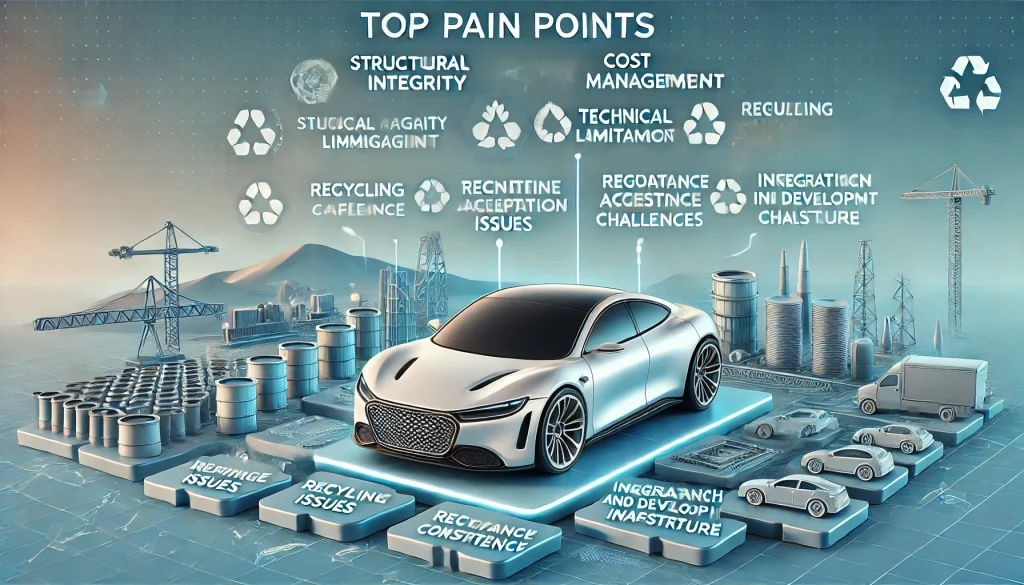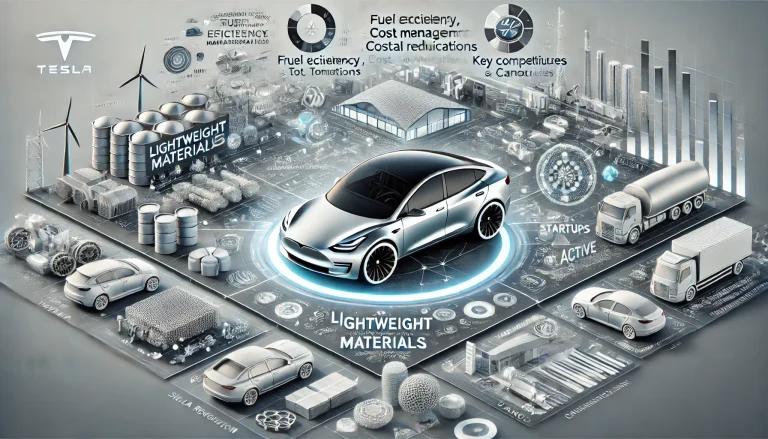Problem Statement
The development and adoption of lightweight materials in vehicle manufacturing are crucial for improving fuel efficiency and reducing emissions. Challenges include ensuring structural integrity and safety, managing costs, and overcoming technical limitations. Advancing lightweight material technology is essential for the future of sustainable automotive design.
Pain Points
- Structural integrity
- Cost management
- Technical limitations
- Recycling issues
- Market acceptance
- Supply chain challenges
- Regulatory compliance
- Performance consistency
- Integration with existing infrastructure
- High R&D costs

Future Vision
The future of automotive manufacturing hinges on integrating lightweight materials to enhance fuel efficiency and reduce emissions. Innovations in material science and manufacturing processes will pave the way for safer, more efficient vehicles. Collaboration among stakeholders will drive this transformation towards a sustainable automotive industry.
Use Cases
- Passenger vehicles
- Commercial trucks
- Electric vehicles
- Public transport
- Aerospace applications
- Sports cars
- Heavy machinery
- Marine vessels
- Railway systems
- Bicycles and motorcycles
Target Users and Stakeholders
- Target Users: Automotive manufacturers
- Age Group: 30-60 years
- Gender: M/F
- Usage Pattern: Daily use in design and production processes
- Benefit: Improved vehicle efficiency and regulatory compliance
- Stakeholders: Automotive engineers, material suppliers, regulatory bodies, consumers, environmental organizations
Key Competition
- Tesla
- Toyota
- BMW
- Ford
- Audi
Products/Services
- Tesla: Lightweight aluminum and battery technology
- Toyota: Hybrid vehicles with advanced material use
- BMW: Carbon fiber reinforced plastics (CFRP) in iSeries
- Ford: Aluminum bodies in F-Series trucks
- Audi: Aluminum and hybrid construction in various models
Active Startups
- Carbon Revolution
- Sila Nanotechnologies
- Canoo
- Lightweight Metals
- Hyperloop Technologies
- NIO
- Lucid Motors
- Rivian
- Byton
- Arrival
Ongoing Work in Related Areas
- Advanced composites
- Recycling techniques
- Mass production technologies
- Cost reduction innovations
- Safety testing
- Hybrid materials
- Supply chain improvements
- Sustainability in production
- Performance optimization
- Industry collaboration
Recent Investment
- Tesla: $1.5 billion in advanced material R&D (2023)
- BMW: $750 million in carbon fiber technology (2022)
- Ford: $500 million in aluminum research (2022)
- Lucid Motors: $2 billion in lightweight EV manufacturing (2023)
- Arrival: $300 million in composite material development (2023)
Market Maturity
The market for lightweight materials in automotive manufacturing is maturing, with advancements in material science and growing acceptance among major manufacturers. Challenges remain in cost reduction, mass production, and recycling, indicating the need for continued innovation and investment.
Summary
The automotive industry’s shift towards lightweight materials aims to improve fuel efficiency and reduce emissions. These materials offer significant benefits but also pose challenges related to structural integrity, cost, and technical limitations. Future advancements depend on ongoing research, innovation, and collaboration among stakeholders. Key competitors and startups are actively advancing lightweight material technology, with recent investments highlighting the industry’s commitment to sustainability. As the market matures, successfully integrating lightweight materials will be crucial for developing safer, more efficient, and environmentally friendly vehicles.



